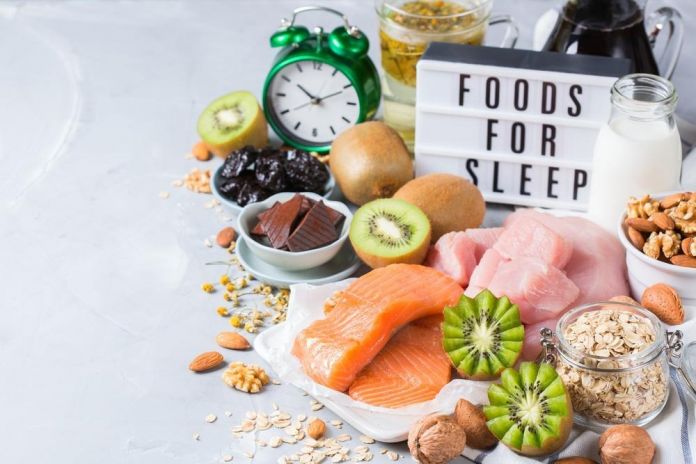Did you know that Eating Habits also play a vital role in better sleep dietary habits is a complicated approach that surrounds not only what we eat but also when and how we consume our meals and beverages. So, if you are struggling with better sleep or want to change your eating habit for better sleep, then this article is for you.
Table of Contents
ToggleLink Between Diet and Sleep
There is a deep link between Healthy Diet and Deep sleep however, sleep is a prominent component of overall health and well-being, which also playing a crucial role in cognitive function, mood regulation, immune function, and metabolic balance. For the phosphorous and healthy lifestyle, both diet and sleep are equally important. For deep and healthy sleep, you need to follow a healthy diet.
Similarly, poor sleep can have profound negative effects on our health, leading to increased risk of chronic conditions such as obesity, diabetes, cardiovascular disease, and mental health disorders.
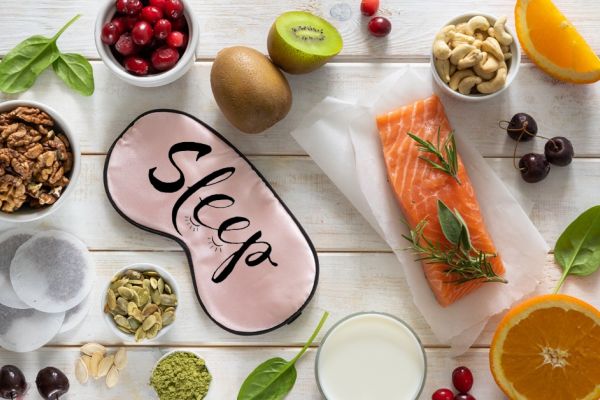
Our eating choices and eating patterns can significantly influence our sleep quality. Certain foods and nutrients that promote relaxation and sleep onset, while others can disrupt sleep patterns or cause discomfort.
Additionally, the timing of meals and the impact of substances like caffeine and alcohol play pivotal roles in sleep regulation.
Tips- Eating Habits for Better Sleep
However, here are some of the tips that need to be considered while eating for better sleep:
Eat a Balanced Diet: Incorporate with a variety of fruits, vegetables, whole grains, lean proteins, and healthy fats into your meals. A balanced diet provides essential nutrients that support overall health, including sleep and many more. However, A balanced diet that includes a variety of macronutrients (carbohydrates, proteins, and fats) and micronutrients (vitamins and minerals) that is essential for overall health and sleep quality.
- Carbohydrates: Complex carbohydrates like whole grains (e.g., oats, brown rice) that help to increase serotonin production, promoting relaxation and sleepiness.
- Proteins: Consuming adequate amount of protein, especially sources rich in tryptophan (e.g., poultry, dairy, nuts), can aid in the production of serotonin and melatonin, hormones crucial for sleep regulation.
- Fats: Healthy fats (e.g., omega-3 fatty acids found in fish, flaxseeds) are important for brain health and may help improve sleep quality.
- Micronutrients: Minerals like magnesium and zinc, found in foods such as leafy greens, seeds, and nuts, are involved in sleep regulation and relaxation.
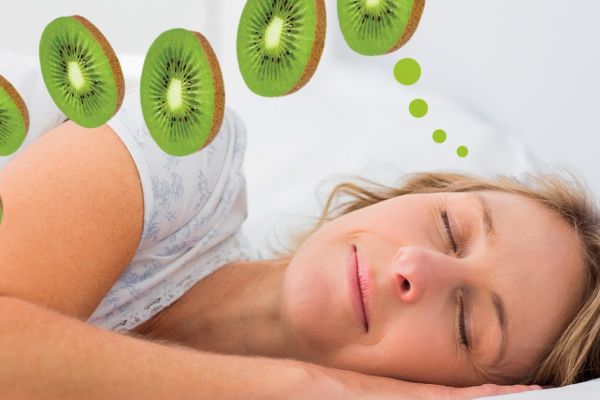
Source: Zespri
Watch Your Timing: Adequate amount of Timming also plays an important role, avoid heavy meals close to bedtime. A large meal can make it harder to fall asleep and may cause discomfort due to digestion. Always aim to finish dinner at least 2-3 hours before bedtime. The timing of meals can influence our circadian rhythm, the body’s internal clock that regulates sleep-wake cycles.
- Avoiding Heavy Meals Before Bed: Large or spicy meals close to bedtime can cause discomfort and disrupt sleep due to increased digestion activity.
- Eating Regularly: Maintaining a consistent eating schedule can help stabilize blood sugar levels and support overall energy balance, which in turn promotes better sleep.
Limit Caffeine and Nicotine: Caffeine and nicotine are stimulants that can interfere with sleep. Limit your intake and avoid consuming them close to bedtime. Caffeine is a central nervous system stimulant that can increase alertness and temporarily ward off drowsiness. Also, A stimulant found in coffee, tea, chocolate, and some medications, caffeine can interfere with sleep onset and quality. Limiting caffeine intake, especially in the afternoon and evening, can improve sleep. However, Nicotine is both a stimulant and a relaxant, depending on the dosage and frequency of use. It can initially increase alertness but also has calming effects. Nicotine disrupts sleep architecture by reducing total sleep time, decreasing REM sleep (dream sleep), and increasing the number of stages of sleep.
Be Mindful of Alcohol: While taking alcohol it might make you feel drowsy initially, also, it can disrupt your sleep later in the night. Try to limit alcohol consumption and avoid drinking close to bedtime. While alcohol may initially induce drowsiness, it can disrupt sleep patterns and reduce overall sleep quality. Moderation and avoiding alcohol close to bedtime are advisable.
Sleep-Supportive Snacks: If you need a snack before bed, for something light and sleep-supportive. Foods like a small bowl of whole-grain cereal with milk, a banana, yogurt, or a handful of nuts contain sleep-promoting nutrients like magnesium and tryptophan. Snacks that are low in sugar and fat but rich in sleep-promoting nutrients.

Hydration: Stay hydrated throughout the day but reduce your fluid intake close to bedtime to minimize trips to the bathroom during the night, which can disrupt sleep. Balanced hydration is essential for overall health and can impact sleep quality. Aim to stay hydrated throughout the day but reduce fluid intake close to bedtime to minimize disturbances from nighttime bathroom visits. So hydration limit is also the most but not in the nighttime.
Consider Herbal Teas: Some herbal teas, such as chamomile or valerian root, are known for their calming effects and can promote relaxation before bedtime. Certain herbal teas, such as chamomile, valerian root, and lavender, have calming properties that can promote relaxation and facilitate sleep.
Listen to Your Body: Pay attention to how different foods and eating patterns affect your sleep. Everyone’s body responds differently, so adjust your habits based on what helps you sleep better.
List of the food that helps for better sleep
| Carbohydrates | Lean Proteins | Fruits | Vegetables | Dairy | Nuts and Seeds | Herbs and Spices |
| Whole grains | Turkey | Bananas | Leafy greens | Milk | Almonds | Chamomile |
| Oats | Chicken | Cherries | Broccoli | Yogurt | Walnuts | Lavender |
| Brown rice | Fish | Kiwi | Bell peppers | Cheese | Flaxseeds | |
| Quinoa | salmon | Brussels sprouts | Chia seeds | |||
| Sweet potatoes | tuna | |||||
| Tofu | ||||||
| Beans and legumes |
Practical Tips for Better Sleep
- Keep a Food and Sleep Diary: Your dietary intake and sleep patterns can help identify correlations between specific foods or eating habits and sleep quality.
- Create a Relaxing Bedtime Routine: Incorporate with relaxation techniques such as gentle stretching, meditation, or reading a book to unwind before bed.
- Limit Screen Time: Reduce exposure to blue light from electronic devices (phones, tablets, computers) before bedtime, as it can interfere with melatonin production and disrupt sleep.
- Maintain a Comfortable Sleep Environment: Make sure that your bedroom is conducive to sleep by regulating temperature, reducing noise, and optimizing comfort with supportive bedding and pillows.
- Seek Professional Guidance: If any sleep problems persist despite implementing dietary and lifestyle changes, consult a healthcare professional or a registered dietitian who specializes in sleep and nutrition for personalized recommendations.
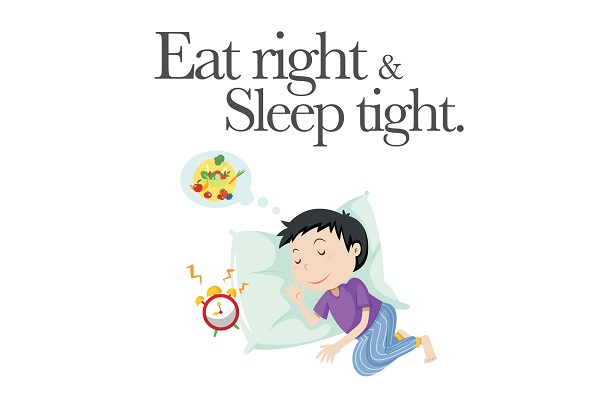
Source: the yoga institute
Tips for Eating for Better Sleep:
- Balance Your Meals: Aim for balanced meals that include a combination of complex carbohydrates, lean proteins, and healthy fats. This balance helps stabilize blood sugar levels and promotes sustained energy throughout the day.
- Watch Portion Sizes: Avoid heavy or large meals close to bedtime, as they can cause discomfort and indigestion, making it harder to fall asleep.
- Limit Caffeine and Alcohol: Both caffeine and alcohol can disrupt sleep patterns. Avoid consuming these substances close to bedtime to improve sleep quality.
- Stay Hydrated: Drink plenty of water throughout the day but reduce fluid intake close to bedtime to minimize disruptions from nighttime bathroom trips.
- Establish a Bedtime Routine: Create a relaxing bedtime routine which includes eating a light snack if needed.
Foods That Promote Better Sleep:
- Complex Carbohydrates: Whole grains (such as oats, quinoa, brown rice), sweet potatoes, whole-wheat bread. Similarly, complex carbohydrates can increase serotonin production in the brain, which promotes relaxation and helps regulate sleep.
- Fruits and Vegetables: Bananas, cherries, kiwi, spinach, kale. Some fruits and vegetables contain vitamins (like B6 in bananas) and minerals (like magnesium in spinach) that are involved in the production of sleep-regulating hormones like melatonin.
- Lean Proteins: Turkey, chicken, fish, tofu, beans. Protein-rich foods contain amino acids, including tryptophan, which is a precursor to serotonin and melatonin. These hormones help regulate sleep cycles.
- Dairy Products: Milk, yogurt, cheese (preferably low-fat or non-fat options). Dairy products contain tryptophan and also provide calcium, which helps the brain use tryptophan to produce melatonin.
- Nuts and Seeds: Almonds, walnuts, flaxseeds, chia seeds. Nuts and seeds are good sources of magnesium and healthy fats, which can promote relaxation and improve sleep quality.
- Herbal Teas: Chamomile tea, valerian root tea, lavender tea. Herbal teas have calming and relaxing properties that can help reduce stress and prepare the body for sleep.
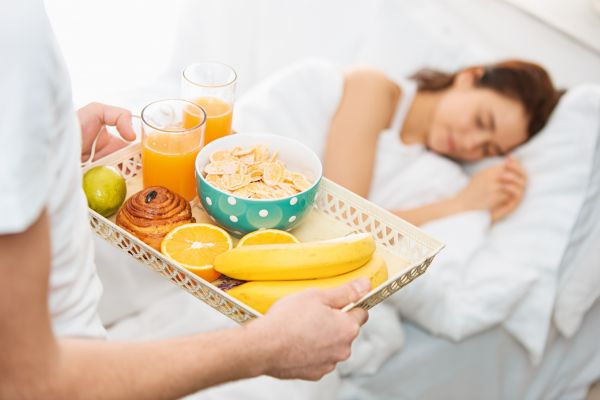
Source: Sleepify
Conclusion
Improving sleep quality through eating habits involves adopting a holistic approach that considers not only what we eat but also how and when we consume our meals. With incorporating sleep-supportive foods, managing the timing of meals and beverages, and being mindful of substances that can affect sleep, individuals can optimize their sleep hygiene and overall well-being.
Understand the complex interplay between diet and sleep and implementing evidence-based strategies, also you can take proactive steps towards achieving better sleep quality and enjoying the numerous health benefits that come with it.
FAQs
When should I eat to promote better sleep?
Finish your dinner at least 2-3 hours before bedtime to aid digestion.
Should I take supplements or vitamins to improve sleep?
If necessary then you can take, Melatonin supplements may help regulate sleep-wake cycles for some people.
What else can I do to improve my sleep besides eating habits?
Create a bedtime routine, limit screen time before bed, and create a comfortable sleep environment (cool, dark, quiet) to promote restful sleep.
Which foods should I avoid before bedtime?
Foods that needed to avoid is caffeine (coffee, tea, chocolate), heavy or spicy meals, and alcohol close to bedtime as because they can disrupt sleep patterns.
Can certain drinks help me sleep better?
Herbal teas like chamomile and warm milk contain sleep-promoting compounds that can aid relaxation before bed.
Also, read more about The Science Behind Postprandial Sleepiness: Causes of Feeling Sleepy After Eating
